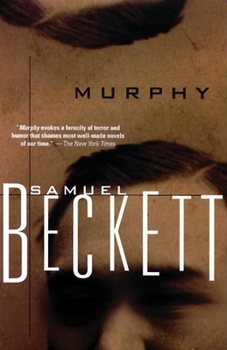Murphy
Select Format
Select Condition 
Book Overview
'Murphy', Samuel Beckett's first published novel, was written in English and published in London in 1938; Beckett himself subsequently translated the book into French, and it was published in France... This description may be from another edition of this product.
Format:Paperback
Language:English
ISBN:0802150373
ISBN13:9780802150370
Release Date:January 1994
Publisher:Grove Press
Length:288 Pages
Weight:1.00 lbs.
Dimensions:0.8" x 5.4" x 8.3"
Customer Reviews
4 ratings
Comic-tragic masterpiece
Published by Thriftbooks.com User , 18 years ago
Murphy is a novel unlike any other. Quite deliberately, Beckett's characters are not portrayed with realistic fullness, and the plot is fragmented and incomplete. Nevertheless, this is an enjoyable read if conventional expectations are suspended. Beckett's early work is often compared to Joyce, but they are actually very different. Beckett's works are essentially tragic-comic. There is one passage that perfectly encapsulates the problem of desire: "I greatly fear," said Wylie, "that the syndrome known as life is too diffuse to admit of palliation. For every symptom that is eased, another is made worse. The horse leech's daughter is a closed system. Her quantum of wantum cannot vary." Beckett considered this passage important enough to repeat twice in his novel. Murphy, the protagonist of this novel, realizes in effect that desire can never be satisfied, and so he simply withdraws from life, attempting to reach a state of catatonic stupor. His girlfriend tries with tragic pathos to draw him back into life, but her attempts are doomed to failure. Murphy's friends are all similar to himself, fragmented and incomplete. The novel's vision is absurdist, tragic, and existentialist--humans are "windowless monads," doomed to isolation and misunderstanding. Beckett's achievement consists primarily in the brilliantly original language used to communicate his vision. Like Shakespeare or any great poet, his work cannot be summarized but must be experienced.
Beckett is laughing at us all
Published by Thriftbooks.com User , 24 years ago
What is fascinating about a work such as this is the absolute division of opinions regarding the importance of this book. Murphy is a style unto itself. It is a story without an internal plot. The character Murphy is fueled only by his desire to desire nothing, and in search of this goal seem to get nowhere. The real message of the book is based solely in the question of existence. While Beckett does borrow and steal quite a bit of idealology form other notables, his expression of the Mind/Body Split and the concepts of the Id, Ego, And Superego, leave me stunned and hollow inside. An intense read, I reccomend a single sitting of about 5 hours, and have a friend or two read it seperately, then discuss. It can change your life. P.S. Beckett would think it absurd that I feel this strongly about his book.
funniest existentialist post joycean black comedy ever
Published by Thriftbooks.com User , 24 years ago
not only does this book have the best first sentence of any twentieth century book, its subtle and precise sentences illustrate an author in control of his language. whilst it may not appeal to those who find the interminable boredom of Godot somehow profound, it illustrates that Beckett could write structured narrative within a comprehensible plot if he wanted to. beckett's sympathy for his characters whilst at the same time ridiculing their pretensions in his own quiet way is austenian in its subtlety, and as an introduction to the later trilogy it is unmissable.
A masterpiece
Published by Thriftbooks.com User , 26 years ago
Not as powerful as the fiction he would write in the next decade in France, but funny. The self-conscious narration resembles some of the humor of Watt(in the footnotes and the appendix), but as it's chief expressive voice. Beckett tries to write about philosophy, probably why this is the least philosophically expressive novel of them all. There is actually a story here, farcical as it is. Probably the first reader-participation novel written(you gotta play chess). Hints of what was to come, but mostly in retrospect. Murphy is a fun read, it's almost a shame it was written by the author of Waiting for Godot, Molloy, Endgame, Stories & Texts for Nothing, footfalls: it doesn't come close to the complexities expressed in those works, probably because it follows Joyce, and tries.




